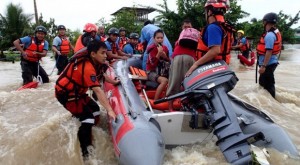Coast Guard looks to students for help with rescue, cleanup
MANILA, Philippines—The Philippine Coast Guard (PCG) wants college students to be its force multiplier in search and rescue (SAR) missions, particularly during heavy flooding.

Personnel from the ComVal Emergency Response Team evacuate residents who were trapped in the flooding of Compostela Valley province in Mindanao in January this year. College students and the youth are a big help in times of disaster. AP FILE PHOTO
According to PCG spokesperson Commander Armand Balilo, the Coast Guard also would teach college students how to take care of marine resources, which are often damaged by oil spills from sunken vessels or leaks from oil pipes.
“Considering the problems caused by climate change, we should equip the people, including the students, with the basic skills on how to respond in the event that they are faced with incidents such as heavy flooding in their area and how to protect the environment during an oil spill,” he said.
Rescue delays
While assuring the public the PCG is ready to respond to distress calls, Balilo said there may be instances when obstacles would delay their rescue teams.
“Besides, the public should not solely depend on the government for rescue and response. They should also know how to act and save themselves,” he said.
In the past, short training courses were given by the civilian maritime agency to students and government personnel. But this time, the Commission on Higher Education has formally included such courses in its National Service Training Program (NSTP), he said.
According to Balilo, four of the PCG-Civil Welfare Training Service modules will be incorporated into the NSTP program offered in schools beginning this school year.
Basic concepts
The first module, Disaster Risk Reduction and Management Awareness, would give students an overview of the country’s geographical profile, disaster risk profile and the disaster management system.
“They will also be taught the basic concept of maritime SAR, including the stages and phases of SAR operations,” Balilo said.
The second module involves the basics of maritime environment protection, and concepts on hazardous wastes, marine pollution and the National Oil Spill Contingency Plan.
The third module covers discussions on the history and functions of the PCG and the agency’s concept of leadership, while the fourth module covers community service information, particularly on coastal cleanup, mangrove planting, tsunami preparedness response and oil spill cleanup.
Balilo said several schools had expressed interest to include the PCG modules in the NSTP.
RELATED STORIES
PNP, Coast Guard to keep watch over Bangsamoro waters—Ferrer
Coast guard seizes smuggled fuel in Palawan